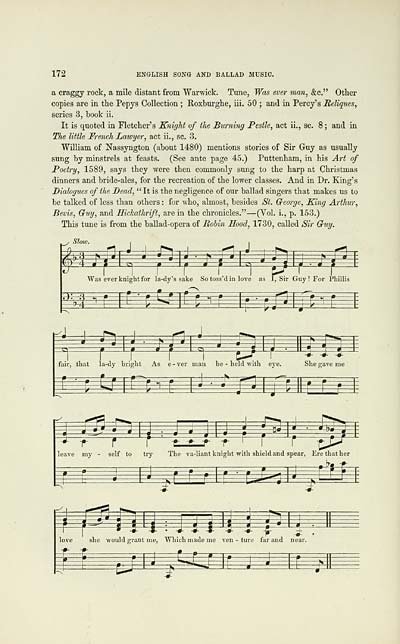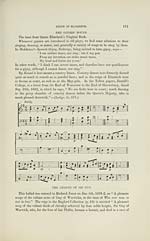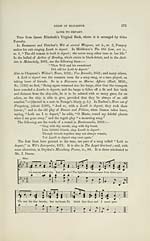Glen Collection of printed music > Printed text > Popular music of the olden time > Volume 1
(206) Page 172
Download files
Complete book:
Individual page:
Thumbnail gallery: Grid view | List view

172
ENGLISH SONG AND BALLAD MUSIC,
a craggy rock, a mile distant from Warwick. Tune, Was ever man, &c." Other
copies are in the Pepys Collection ; Roxburghe, iii. 50 ; and in Percy's Reliques,
series 3, book ii.
It is quoted in Fletcher's Knight of the Burning Pestle, act ii., sc. 8 ; and in
Tlie little French Lawyer, act ii., sc. 3.
William of Nassyngton (about 1480) mentions stories of Sir Guy as usually
sung by minstrels at feasts. (See ante page 45.) Puttenham, in his Art of
Poetry, 1589, says they were then commonly sung to the harp at Christmas
dinners and bride-ales, for the recreation of the lower classes. And in Dr. King's
Dialogues of the Dead, "It is the negligence of our ballad singers that makes us to
be talked of less than others : for who, almost, besides St. G-eorge, King Arthur,
Bevis, Guy, and Hichathrift, are in the chronicles." — (Vol. i., p. 153.)
This tune is from the ballad-opera of Robin Hood, 1730, called Sir Guy.
Slow.
^ J J^ i J
^
J-
Was ever knight for la-dy's sake Sotoss'din love as I, Sir Guy ! For Phillis
WW
^m
1 V* ' # ^
J ^ i J
^
W
•^ . r. ' .r.
3:5=
^=^
fair, tliat la-dy bright As e - ver man be - held with eye. She gave me
c :.; i rMr \^- ^
^^
E^^S^
m
M
f '7 ^-LLi ' ; r r ' r
leave my - self to try The va-liant knight with shield and spear, Ere that her
i-pH i \ i ■ ufttpn
love she would grant me. Which made me ven - ture far and near.
^
^
E^
m
ENGLISH SONG AND BALLAD MUSIC,
a craggy rock, a mile distant from Warwick. Tune, Was ever man, &c." Other
copies are in the Pepys Collection ; Roxburghe, iii. 50 ; and in Percy's Reliques,
series 3, book ii.
It is quoted in Fletcher's Knight of the Burning Pestle, act ii., sc. 8 ; and in
Tlie little French Lawyer, act ii., sc. 3.
William of Nassyngton (about 1480) mentions stories of Sir Guy as usually
sung by minstrels at feasts. (See ante page 45.) Puttenham, in his Art of
Poetry, 1589, says they were then commonly sung to the harp at Christmas
dinners and bride-ales, for the recreation of the lower classes. And in Dr. King's
Dialogues of the Dead, "It is the negligence of our ballad singers that makes us to
be talked of less than others : for who, almost, besides St. G-eorge, King Arthur,
Bevis, Guy, and Hichathrift, are in the chronicles." — (Vol. i., p. 153.)
This tune is from the ballad-opera of Robin Hood, 1730, called Sir Guy.
Slow.
^ J J^ i J
^
J-
Was ever knight for la-dy's sake Sotoss'din love as I, Sir Guy ! For Phillis
WW
^m
1 V* ' # ^
J ^ i J
^
W
•^ . r. ' .r.
3:5=
^=^
fair, tliat la-dy bright As e - ver man be - held with eye. She gave me
c :.; i rMr \^- ^
^^
E^^S^
m
M
f '7 ^-LLi ' ; r r ' r
leave my - self to try The va-liant knight with shield and spear, Ere that her
i-pH i \ i ■ ufttpn
love she would grant me. Which made me ven - ture far and near.
^
^
E^
m
Set display mode to: Large image | Transcription
Images and transcriptions on this page, including medium image downloads, may be used under the Creative Commons Attribution 4.0 International Licence unless otherwise stated. ![]()
| Special collections of printed music > Glen Collection of printed music > Printed text > Popular music of the olden time > Volume 1 > (206) Page 172 |
|---|
| Permanent URL | https://digital.nls.uk/91369919 |
|---|
| Shelfmark | Glen.254 |
|---|---|
| Additional NLS resources: | |
| Attribution and copyright: |
|
| Description | Scottish songs and music of the 18th and early 19th centuries, including music for the Highland bagpipe. These are selected items from the collection of John Glen (1833 to 1904). Also includes a few manuscripts, some treatises, and other books on the subject. |
|---|
| Description | The Glen Collection and the Inglis Collection represent mainly 18th and 19th century Scottish music, including Scottish songs. The collections of Berlioz and Verdi collected by bibliographer Cecil Hopkinson contain contemporary and later editions of the works of the two composers Berlioz and Verdi. |
|---|

